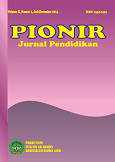PENGARUH SELF EFFICACY TERHADAP KEMAMPUAN MEMECAHKAN MASALAH IPA
DOI:
https://doi.org/10.22373/pjp.v11i1.13138Keywords:
Ability to solve problems, Self efficacy, ScienceAbstract
This research is motivated by the lack of ability to solve problems in grade 5 students. This study aims to determine the effect of self-efficacy on the ability to solve science problems. The sample in this study were 50 grade 5 students. This research is a quantitative research. Data analysis used simple linear regression. Based on the data analysis, the regression equation Ŷ = 50.333 + 0.489X is obtained. From hypothesis testing, the value of tcount is greater than ttable, namely 3. 314 > 2.010, then H0 is rejected and Ha is accepted. Thus, there is a significant effect of self-efficacy on the ability to solve science problems for grade 5 students.
References
Astuti, Hara Permana, Farida Harahap, and Budi. “Hubungan Antara Efikasi ….” Jurnal Hisbah 13, no. 1 (2016): 51–68.
Budiarta, R S, Dwia Kurniawan, and ... “Evaluation of the Results of Attitudes and Self-Efficacy of Middle School Students in Science Subjects.” Journal of … 5, no. 4 (2021): 525–35.
CLEMSON, LINDY, and MEGAN SWANN. “Stepping On: Building Confidance and Reducing Falls A Community Based Program for Older People.” Stepping On, 2020, 71–73.
Ernawati, M Dwi Wiwik, Asrial Asrial, Dwi Agus Kurniawan, Wahyu Adi Pratama, and Rahmat Perdana. “Attitudes and Self-Efficacy: Perspectives on Science Subjects for Junior High School Students.” Jurnal Pendidikan Dan Pengajaran 54, no. 3 (2021): 456–66.
Flammer, August. “Social Foundations of Thought and Action: A Social Cognitive Theory.” International Encyclopedia of the Social & Behavioral Sciences: Second Edition 4, no. 1994 (2015): 504–8.
Hadi, Syamsul, and Novaliyosi. “TIMSS Indonesia (Trends in International Mathematics and Science Study).” Prosiding Seminar Nasional & Call For Papers Program Studi Magister Pendidikan Matematika Universitas Siliwangi, 2019, 562–69.
Harlen Wynne, A. Q. The Teaching of Science: Studies in Primary Education. Edited by David Fulton Publishers. 5th ed. London, 2009.
Hasanah, Rena Siti, Hayat Sholihin, and Ikmanda Nugraha. “An Investigation of Junior High School Students’ Science Self-Efficacy and Its Correlation with Their Science Achievement in Different School Systems.” Journal of Science Learning 4, no. 2 (2021): 192–202.
Isti, Anah, Berti Yolida, and Tri Jalmo. “Hubungan Self-Efficacy Berdasarkan Gender Dengan Hasil Belajar IPA.” Jurnal Bioterdidik: Wahana Ekspresi Ilmiah 7, no. 4 (2019): 1–9.
Kartimi, Kartimi, Indah Rizki Anugrah, and Istiqomah Addiin. “Systematic Literature Review: Science Self-Efficacy in Science Learning.” Al-Khwarizmi : Jurnal Pendidikan Matematika Dan Ilmu Pengetahuan Alam 9, no. 2 (2021): 13–34.
Khan, Azizuddin, Eleni Fleva, and Tabassum Qazi. “Role of Self-Esteem and General Self-Efficacy in Teachers’ Efficacy in Primary Schools.” Psychology 06, no. 01 (2015): 117–25.
Nisa, Khaerun, Retno Triwoelandari, and Ahmad Mulyadi Kosim. “Pengaruh Strategi Metakognitif Terhadap Self-Efficacy Pada Pembelajaran Sains Kelas V SD.” Jurnal Mitra Pendidikan 2, no. 10 (2018): 1063–77.
Permana, Rakhmat hidayatulloh. “No Title.” News Detik.Com, 2019.
Taufik, L. “Academic Self-Efficacy Mahasiswa Calon Guru Sd Dalam Pembelajaran Konsep Dasar Ipa Subkonsep Biologi.” Bio Educatio 3, no. 1 (2018): 279516.
Trisnawati, Nika Fetria. “Efektifitas Model Group Investigation Dalam Meningkatkan Hasil Belajar Dan Self Efficacy.” UNION: Jurnal Ilmiah Pendidikan Matematika 7, no. 3 (2019): 427–36.
Usman, Samatova. Pembelajaran IPA Di Sekolah Dasar. Jakarta: Indeks., 2016.
Yasa, I Ketut Dena, Ketut Pudjawan, and I Gusti Ayu Tri Agustiana. “Peningkatan Efikasi Diri Siswa Pada Mata Pelajaran IPA Kelas IV SD Melalui Model Pembelajaran Numbered Head Together.” Mimbar PGSD Undiksha 8, no. 3 (2020): 330–41.
Yuliyani, Rahmawati. “Peran Efikasi Diri (Self Efficacy) Dan Kemampuan Berpikir Positif Terhadap Kemampuan Pemecahan Masalah Matematika” 7, no. 2 (2017): 130–43.
Downloads
Published
Issue
Section
License
- Authors retain copyright and grant the journal right of first publication with the work simultaneously licensed under a Creative Commons Attribution License that allows others to share the work with an acknowledgment of the work's authorship and initial publication in this journal.
- Authors are able to enter into separate, additional contractual arrangements for the non-exclusive distribution of the journal's published version of the work (e.g., post it to an institutional repository or publish it in a book), with an acknowledgment of its initial publication in this journal.
- Authors are permitted and encouraged to post their work online (e.g., in institutional repositories or on their website) prior to and during the submission process, as it can lead to productive exchanges, as well as earlier and greater citation of published work (See The Effect of Open Access).

